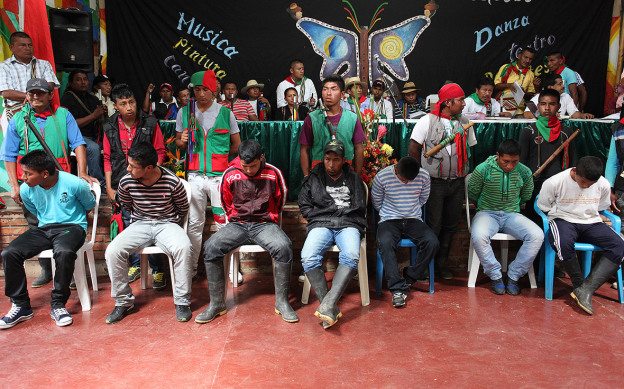 In Colombia, the Nasa and other indigenous groups have authorities, backed by constitutional law, to administer order and justice autonomously for the territories that they govern—as long as their judicial rulings and application of law do not contravene international law.
In Colombia, the Nasa and other indigenous groups have authorities, backed by constitutional law, to administer order and justice autonomously for the territories that they govern—as long as their judicial rulings and application of law do not contravene international law.
This was demonstrated last week when members of the Nasa tribe (also known as the Páez people) near Toribio, Cauca province, Colombia captured seven members of the “Revolutionary Armed Forces of Colombia” (FARC) and put them on trial for murder. The subsequent trial, in a very public village council session handed down a 60 year jail sentence for the FARC member who confessed to the killings, a 40 year jail sentence for FARC members that indiscriminately shot at other Nasa people, and 20 lashes and detention for two juvenile members. The FARC members’ rifles and handguns, along with their uniform fatigues and other equipment were publicly destroyed as part of the proceedings.
The influence of Colombian indigenous groups goes beyond their legal authorities. In the same area of Cauca province, approximately 1000 Nasa members surrounded a Colombian army outpost and forcibly removed more than 100 soldiers manning positions. After the expulsion, the Nasa dismantled the facility and trenches erected by the security forces and marched on FARC rebel camps in the surrounding mountains. The leader of the indigenous commission demanded the rebels leave the ancestral lands giving FARC rebels a two-week deadline saying, “If they don’t pack up their camps, we’ll pack them up for them.”
Private companies are also susceptible to the influence of indigenous groups. In March 2014 the U’wa Indians, a 7,000 member tribe in Colombia, destroyed a section of pipeline in the remote northeastern state of Norte de Santander. The 480 mile pipeline is used by state oil company Ecopetrol SA and California-based Occidental Petroleum Corp (OPC) to transport oil to the coast for export. Following the pipeline attack, members of the indigenous group surrounded the area where the pipeline was damaged and would not allow workers to repair the damage so production could resume. The actions of the U’wa Indians has shut down Colombia’s second-longest oil pipeline for over a month costing OPC and the government more than $130 million.
 The Colombian examples demonstrate the influence of populations and their impact on private sector companies, governments, and even narco-traffickers and extremist groups. Interaction with government representative at the national level and reliance on military forces to provide security and safeguard operations against local groups or tribes does not guarantee uninterrupted production. Companies must incorporate local community dialogue and actions to develop buy-in and long-term security. And, in the case of local communities having firmly established legal authorities, engagement and agreement with local community representatives must be a priority from the very beginning. Understanding and engaging indigenous groups and populations is key for both national governments and private investors with facilities, people, and capital at stake.
The Colombian examples demonstrate the influence of populations and their impact on private sector companies, governments, and even narco-traffickers and extremist groups. Interaction with government representative at the national level and reliance on military forces to provide security and safeguard operations against local groups or tribes does not guarantee uninterrupted production. Companies must incorporate local community dialogue and actions to develop buy-in and long-term security. And, in the case of local communities having firmly established legal authorities, engagement and agreement with local community representatives must be a priority from the very beginning. Understanding and engaging indigenous groups and populations is key for both national governments and private investors with facilities, people, and capital at stake.
Related articles across the web

